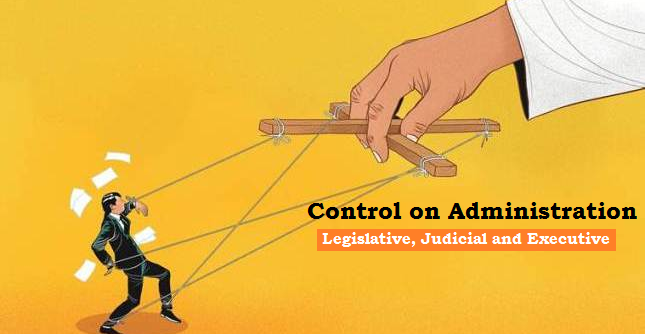
Administration is run by the bureaucracy- the officers appointed in different departments. They follow the rules and procedures framed by the Legislature and the Executive. They can’t work and act arbitrarily as they have different kind of controls- parliamentary (legislature), financial (on budget and expenditure), judicial and executive.
Need of Control:
- Necessary to check the dangers of bureaucratic power against despotic exercise
- To deal with conflict of interest
- To safeguard the rights and liberties of the citizens
Types of Control:
- Internal: control by mechanisms which are within the system
- Personal management, hierarchical orders
- Departmental enquiry, Annual Confidential Reports, etc
- External: control by mechanisms from outside the system
- Laid down by Constitution
- Legislature, executive and judiciary
- Specialized agencies like Lokpal, Information Commissioner, etc
Legislative Control
The Parliament or Legislature has the following controls on the bureaucracy:
- General Control:
- Makes laws or amend laws which determine the conditions of organization, structure and powers of administration
- Makes policies of the Govt and debates on them through legislative procedures (e.g. Question Hour, Zero Hour, Censure Motion, etc)
- Budgetary Control:
- Legislature is the ultimate authority to sanction Govt funds through Budget
- Decides taxation (enactment or alteration)
- Through Committees:
- Comptroller and Auditor General on behalf of legislature through audits
- Standing and Ad Hoc Committees take up the issues and carry out a great deal of the work of the legislature. (e.g. Committee on estimates, Rules Committee, etc)
Executive Control
The Executive has the following controls on the bureaucracy:
- Policy making: is carried out by the Cabinet and officials are responsible to the it
- Budgetary system: allocation of funds for different activities
- Personnel management: through posting, transfer and recruitment process
- Delegated legislation: Executive makes the detailed policy passed by the legislature
- Civil service code: guides the conduct of the bureaucracy
Judicial Control
The Judiciary has the following controls on the bureaucracy:
- Judiciary system: judiciary to maintain ‘rule of law’ against the arbitrary use of power by the authority. India has an integrated judicial system with SC at the top and HCs below it under which there are subordinate courts.
- Judicial review: judiciary to examine the constitutionality of an administrative order or action
- Writs: right to move to Supreme Court (or High Courts) in case of any violation of rights enshrined in Part III of the Constitution

 Home
Home Syllabus
Syllabus Contact Us
Contact Us








